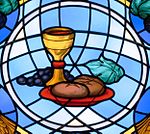

| Part of a series on the |
| Eucharist |
|---|
 |
|
Elements |
|
Ritual and liturgy |
|
Practices and customs
|
|
History |
|
|
|
Denominational teachings |
|
Related articles |
|
|
Anordinance is a term used by certain Christian denominations for a religious ritual that was instituted by Jesus for Christians to observe.[1]
Examples of ordinances include baptism and the Lord's Supper, both of which are practiced in denominations including the Anabaptist, Baptist, Churches of Christ, and Pentecostal denominations.[2][3] Some churches, including those of the Anabaptists, include headcovering and footwashing as ordinances.[4][5][6]
The number of ordinances depends on the Christian denomination, with Mennonite Anabaptists counting seven ordinances,[7] while some Baptists may name two or three.[8]
Christian traditions, including Anabaptists (such as Mennonites and Schwarzenau Brethren), Baptists, Churches of Christ, Christian Churches/Churches of Christ, Disciples of Christ, refer to "ordinances", rather than "sacraments".[9][8][10] While a sacrament is seen as a means of grace from God, an ordinance is a practice that rather demonstrates the participants' faith. Roman Catholics, Eastern Orthodox, and many historic Protestant traditions (Lutherans, Anglicans, Methodists, Moravians, Continental Reformed, Presbyterians and Congregationalists) prefer the use of the term "sacrament".[1]
For Anabaptists, "ordinances brought one into conformity with the truth of Jesus Christ, whose life, crucifixion, death, and resurrection had so fundamentally altered all of humanity and creation that human beings were now capable of works of loving obedience that revealed the indwelling presence of God in Christ in all people."[11]
Seven ordinances have been taught in many Conservative Mennonite churches, which include "baptism, communion, footwashing, marriage, anointing with oil, the holy kiss, and the prayer covering."[7]
The Dunkard Brethren Church, a Conservative Anabaptist denomination in the Schwarzenau Brethren tradition, includes baptism, feetwashing, communion, the holy kiss, headcovering, and anointing of the sick among the ordinances of the Church. Feetwashing, communion and the holy kiss occur during the lovefeast.[12]
Some Baptists teach two ordinances, baptism and the Lord's Supper, as established explicitly by Jesus Christ, while other sacraments include additional ordinances instituted by the Church Fathers in the New Testament, such as "the laying on of hands" or anointing of the sick, as expressed in the Standard Confession (1660).[8][13]
The Church of Jesus Christ of Latter-day Saints (Mormons) uses the term "ordinance", however the underlying belief is sacramental.[1][2] Rituals such as baptism, confirmation, initiatory (Chrismation)[see: washing and anointing], ordination, endowment (formal vows and reception of sacred vestments)[3] and marriage are referred to as "saving ordinances"[4], as they are considered transformative and necessary for salvation and exaltation. Similar to Catholic sacraments, Mormon ordinances are only considered valid if performed by ordained clergy with apostolic succession reaching back to Jesus through Peter.[5][6][7][8]
The Calvary Holiness Association, a Holiness Pentecostal denomination, affirms the ordinances of baptism, the Lord's Supper, and the washing of the Saint's feet.[14]
Certain Pentecostal denominations, such as the Ukrainian Pentecostal Church and the Christian Congregation, among others, observe the ordinance of women's headcovering in obedience to 1 Corinthians 11:4–13.[15]
The term "ordinance" emphasizes the aspect of institution by Christ and the symbolic meaning.
John Calvin and most other Protestant leaders rejected the Roman Catholic sacramental system but retained its vocabulary, applying the term "sacrament" only to ordinances instituted by God himself (cf. Westminster Confession of Faith 27; Belgic Confession 33). ... Unlike Baptists and Anabaptists, who tend to speak of baptism only as an "ordinance," Calvinists have characteristically spoken of baptism not only as an ordinance but also as a sacrament or a mystery, a rite through which God applies grace.
Christians agree universally that baptism and the Lord's Supper were instituted by Christ and should be observed as "ordinances" or "sacraments" by His followers.
This Christianity-related article is a stub. You can help Wikipedia by expanding it. |